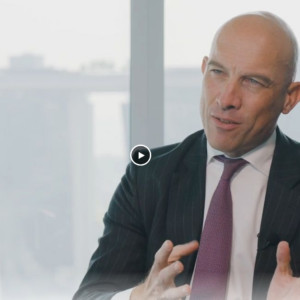Shifting patterns project real estate into investment focus

Requirements for greener buildings, data centres and desire for environmental impact have left investors ramping up allocations to bricks and mortar.
Real estate is once again becoming a favoured asset class among wealth managers and the upper end of their client base, with portfolio allocations gradually on the rise.
Among Swiss private banks, Pictet is leading the charge towards higher allocations. Strategists in Geneva believe bricks and mortar are well suited to unpredictable investment markets, coupled with increased appetite for greener stock and major shifts in working and living patterns.
“I think we're in the early stage of resurgence,” says Zsolt Kohalmi, head of direct real estate at Pictet Alternative Advisors, a division of the high-profile wealth manager.
Last year’s economic climate is described as a “category five hurricane of sorts for real estate” by Mr Kohalmi, with nobody able to correctly forecast the shape of the interest rate curve.
Following a dismal investment environment in 2022, the worst since 2008 and the worst ever for global bonds, with a $10tn loss to ultra-high net worth investors’ (UHNWI) portfolios, 2023 saw a turning point.
According to the 2024 Knight Frank Wealth Report, almost a fifth of UHNWIs plan to invest in commercial real estate, with slightly more planning to purchase residential property.
The European Central Bank appears to have reached the peak of its interest-raising cycle, with rates expected to go down later this year, according to the Swiss bank, with real estate favoured by this changing environment.
Moreover, its inflation-hedging properties could also rescue portfolios. At Pictet, one of the primary concerns of all investment strategists is a return of Donald Trump to the White House and the effect this may have on inflation.
Cohen & Steers, a US investment manager overseeing more than $80bn in real estate-related assets — including securities and real estate investment trusts (Reits) — also expresses positive sentiments towards the asset class.
“I think real estate offers a good yield again. If you look at the listed real estate space and Reits, compared to equities, they're relatively cheap,” says Rogier Quirijns, a 25-year industry veteran, running the firm’s real estate business in Europe.

Fixed income differential
But the differential with fixed income, crucially, is also turning the tide. “Compared to bonds, Reits are looking attractive, if we look at certain dividend yields you can get,” he says.
Based in London, Mr Quirijns has also extensively covered the markets in Scandinavia, the Benelux countries and France. Paris, he says, is one city set to attract wealthy buyers, especially those with a greener outlook. The city has been encouraging more bankers and hedge fund managers to move there, aiming to capitalise on Brexit-induced relocations to the French capital.
The city's appeal is attributed to various factors, including business-friendly reforms, successful events like the Rugby World Cup and the upcoming Olympics as well as urban regeneration projects and the Grand Paris Project.
But experts also warn that a blanket allocation to real estate can be a high-risk strategy, with active management crucial to successful returns. “Real estate values are bifurcating — if you have a brown building, you risk obsolescence and your value keeps going down but if you have a green building in the right location, your value keeps increasing,” says Pictet’s Mr Kohalmi.
Green moves mainstream
According to the UK Met Office, there is a real chance that 2024 will be the warmest year on record. This will undoubtedly affect the property market through shifts in tourism patterns, physical harm to buildings in vulnerable zones, and disruptions in infrastructure.
‘Greenifying’ real estate is certainly going mainstream. Demand is rising globally from both tenants and investors for green and sustainable buildings. As climate-change related damage increases, there will be more focus on technologies that could help property owners adapt to our changing environment. According to the Knight Frank Next Gen Survey, 75 per cent of all HNWIs are trying to reduce their carbon footprint.
Regulatory forces will also play a part in pushing for greener real estate. For example, the US is offering tax incentives to real estate owners to install and generate renewable energy. This is part of the Inflation Reduction Act, set to provide around $370bn in incentives.
Many investment firms are consequently looking to manage real estate investments through an environmental, social and governance (ESG) lens. One prominent player, US investment house Nuveen, says ESG has become a “non-negotiable” part of any real estate investment strategy.
The firm analyses real estate from two perspective: investment returns and environmental impact. “The next generation of investors are more and more looking to build portfolios that impact the world in a way that aligns with their own personal values,” says Harry Bush, head of UK wealth at Nuveen. He says that understanding the impact clients want to have, and creating solutions that reflect this, will be key to wealth management.
But many real estate firms are not yet ready to meet ESG requirements. According to a report by Deloitte, nearly 60 per cent lack the data, processes and internal controls necessary to meet compliance standards.

Demand for data centres
And things are about to become even more challenging for them. By 2027, International Data Corporation (IDC) forecasts that spending on generative AI solutions, encompassing software, related infrastructure hardware, and IT/business services required for implementation, will reach $143bn.
Moreover, according to research by Savills, the pipeline of data centres needs to more than double by 2025 to meet the demand for storage in Europe.
Pictet is preparing for both AI’s role in increased demand for data centres, and for using AI to help manage existing buildings. This includes helping optimise energy consumption, allowing for predictive maintenance, recommending occupant comfort and driving sustainability.
How family offices manage their exposure to real estate may be crucial to their long-term future, especially as this is an asset class towards which people have a close, emotional attachment. “This is the world’s largest asset class,” says Pictet’s Mr Kohalmi, necessitating crucial asset allocation and business decisions about correct exposure.
“A lot of real estate in Europe is typically owned by families,” he says. “It won't always be efficient for families to own real estate directly, especially not in far-flung locations from where they actually live. It's become harder and harder for them to actively manage these assets.”





